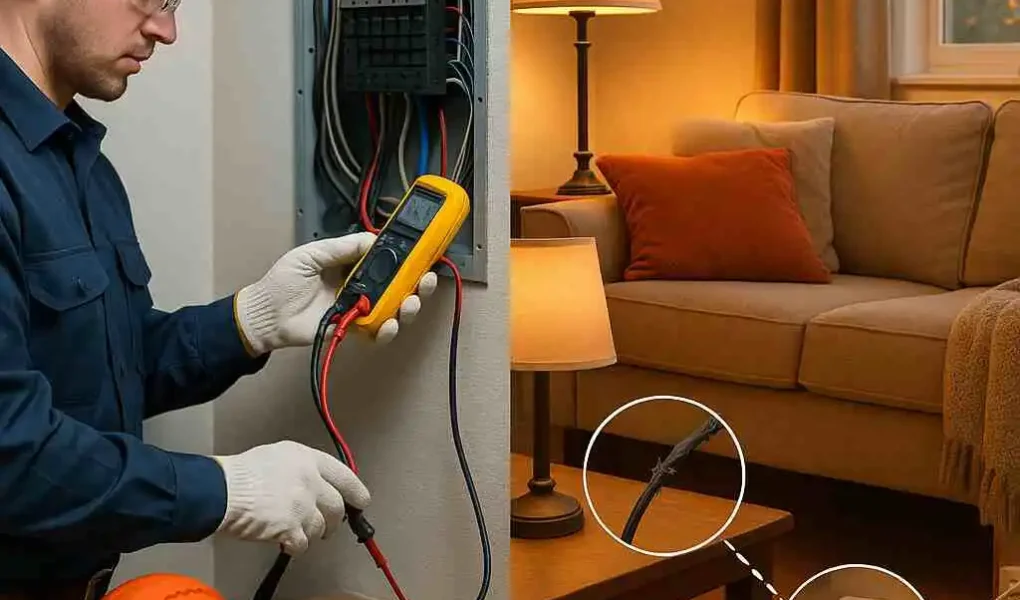Have you ever thought about what’s happening behind your walls each season? Most people don’t think about their home’s electrical system until something goes wrong. Wires, outlets, and circuits work silently, but over time, changes in weather and temperature can affect them.
In this blog, you’ll learn why seasonal electrical system checks matter, what dangers they can prevent, and how you can keep your home safe all year long with simple steps.
The Real Risk of Ignoring Seasonal Changes
Every season brings changes to your home, and your electrical system is no different. In the summer, high temperatures can make wires expand, and in the winter, they may shrink. These small shifts can loosen connections over time.
Many electrical fires start because of damaged wires or old circuit panels. These problems grow slowly and silently. Seasonal checks help catch them early. Checking your system at the start of each season keeps small problems from turning into big disasters.
Why Summer Heat and Winter Cold Matter
Summer heat can stress your electrical system in more ways than one. Air conditioners, fans, and other cooling tools use a lot of energy. If your system isn’t ready, it may overheat or trip breakers.
In the winter, the story changes. Space heaters, electric blankets, and holiday lights all put pressure on your system. If your outlets are already worn or overloaded, this extra use can push them over the edge.
By doing a seasonal check, you can spot these risks before they cause harm. You can also make sure your home is ready for the change in how electricity is used in each season.
What Gets Checked During a Seasonal Inspection
A seasonal electrical inspection usually begins with a look at your circuit breaker panel. A licensed expert checks for loose wires, burn marks, or signs of age. They also test outlets and switches to make sure everything works the way it should.
Outdoor outlets and lighting are important too. They deal with rain, snow, wind, and sun, all of which can cause damage. Inspectors check that weatherproof covers are in place and wires are safe.
These steps may sound simple, but they make a big difference. A single cracked wire or faulty outlet can be a fire hazard. Finding and fixing it early protects your home and everyone in it.
How Seasonal Checks Save You Money
Some people skip seasonal checks because they think they’re too expensive or not needed. But skipping them often leads to bigger problems that cost much more to fix.
If an outlet burns out or a wire sparks a fire, the damage can be costly. Even a small electrical issue can damage your electronics or appliances.
Catching problems early means repairs are usually smaller and cheaper. Seasonal inspections also help you avoid surprise failures, like your heater not working on a cold night or your air conditioner shutting off in the heat.
These checks also help your system run more smoothly, which can lower your electric bill over time. So while a seasonal check might seem like an extra cost, it’s really an investment in safety and savings.
When and How to Schedule Your Inspection
The best time to schedule a seasonal electrical check is before extreme weather starts. Early spring and early fall are smart choices. This timing gives you a chance to prepare for either summer heat or winter cold.
You’ll want someone who is trained and licensed so they can spot problems that others might miss. This is where trusted help makes a big difference. Falcon Electric electricians are known for doing careful and clear inspections.
They explain what they find in simple words and give helpful advice on what to fix and when. Having the right people do the job makes all the difference in keeping your home safe.
It’s also smart to keep a simple record of each inspection. Write down the date, what was checked, and any work done. This helps you keep track of your home’s electrical health over time.
What You Can Do Between Inspections
While you should leave the hard work to professionals, there are a few things you can do on your own between visits. Look at your outlets now and then. If you see scorch marks, cracks, or loose plugs, call for help.
Watch for flickering lights or strange smells near outlets. These can be signs something isn’t right. Keep extension cords and power strips from getting overloaded.
Don’t run them under rugs or furniture. Make sure cords are in good shape and not frayed or broken. Also, test your smoke detectors once a month and change their batteries every season. These small steps go a long way in keeping your home safe and your electrical system strong between seasonal checks.
Why It’s About More Than Just Wires
Some people think an electrical check is only about fixing wires or switches, but it’s really about protecting your home and loved ones. A faulty wire can lead to a fire. A loose connection can shut down your power.
These aren’t just minor problems; they can be serious and even life-threatening. Seasonal inspections help stop these problems before they start. They let you stay in control instead of being caught off guard.
You’re not just checking wires-you’re checking your home’s safety. And the peace of mind that brings is something you can’t put a price on.
Stay Safe All Year with Smart Habits
Building good habits is key. Making seasonal checks part of your yearly home routine is one of the smartest moves you can make. It’s like getting a check-up for your house. You don’t have to wait for something to break before you act.
Instead, you stay a step ahead of the problem. Each season brings its own risks, but the solution stays the same: regular care. You wouldn’t skip checking your car’s brakes or tires.
So don’t skip checking your home’s wiring either. A little care now can save you from big trouble later.
Your Home’s Safety Is Worth It
You now know that seasonal electrical checks are more than just a good idea-they’re a smart way to keep your home safe and your family protected. From catching small problems early to avoiding costly damage later, the benefits are clear.
Timely inspections help you stay safe, save money, and enjoy your home without worry. The next time the seasons change, remember what you’ve learned today and take action.
Did this guide help you? Browse the rest of this section for more advice on a variety of topics.
You may also read (the ultimate seasonal home maintenance checklist).




